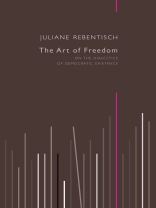The concept of democratic freedom refers to more than the kind of freedom embodied by political institutions and procedures. Democratic freedom can only be properly understood if it is grasped as the expression of a culture of freedom that encompasses an entire form of life. Juliane Rebentisch’s systematic and historical approach demonstrates that we can learn a great deal about the democratic culture of freedom from its philosophical critics.
From Plato to Carl Schmitt, the critique of democratic culture has always been articulated as a critique of its ãaestheticization’. Rebentisch defends various phenomena of aestheticization D from the irony typical of democratic citizens to the theatricality of the political D as constitutive elements of democratic culture and the notion of freedom at the heart of its ethical and political self-conception.
This work will be of particular interest to students of Political Theory, Philosophy and Aesthetics.
Innehållsförteckning
Introduction: Aestheticization D An Apologia
Part I: An Antique Diagnosis of a Crisis
1. The Provocative Beauty of Democracy: Plato
I. Freedom and Indeterminacy
2. The Slavery of the Tyrant
3. The Unstable Democrat
4. Clear-sighted, Processual and Totalized Weakness of Will
5. Weakness of Will or the Freedom from Oneself
6. The Unfree Opportunist
7. Many Jobs and Much Trespassing
8. The Occurrence of an Inner Nature or the Freedom Toward Self
9. Democrats and Theatre Types
10. Theatrocracy: The Fearlessly Judging Multitude
11. Masses and Mimesis
12. Self-Difference and Perfection
Part II: The Ethical-Political Right of Irony
2. The Morality of Irony: Hegel
1. The Beginning of Morality in Socratic Irony
2. Socrates’ Divisive Work
3. Irony and the Practice of Truth
4. Hegel’s Critique of Kant
5. A Socratic Reformulation of the Moral Principle
6. Critique of the Romantics
7. Abstract and Subjective Freedom
8. Evil and the ’Natural Will’
9. The Dialectic of Freedom
10. A Less Rigorous Concept of Self-Determination
11. Conflicts with and in Morality
12. Hegel’s Expulsion of Subjective Freedom from Ethical Life
13. The Riddle of Socratic Virtue and the Historicity of the Good
3. The Ethics of Aesthetic Existence: Kierkegaard
1. The Negative Freedom of Socratic Irony and its Romantic Superseding
2. Self-Enhancement and Forgetfulness-of-Self
3. The Impotent Seducer
4. The ’Helmeted’ Will and its Desperation in the Face of the Aesthetic
5. Repentance and Duty: The Freedom to Choose What One Already Is
6. One Sexism for Another
7. The Love of Divorced Society Ladies
8. Aesthetic and Aristocratic Exception
9. Common sinners
10. The Leap of Faith
11. Repetitions
4. Sovereignty in Romanticism: Schmitt
1. Aestheticization and Neutralization
2. A Look at an Orange
3. Alien Power
4. The Other in the Own and Decision
5. Political Anthropology
6. Schmitt and Kierkegaard
7. Political Theology
8. ’Concrete Life’ and Decision
9. Schmitt’s Rousseauism
10. Politics as a Critique of Politics
Part III: Democracy and Aestheticization
5. The Spectacle of Democracy: Rousseau
1. The Irony of the Actor
2. The Public Expression of Indeterminacy
3. The Actress and Her Parodies
4. The Golden Mean
5. ’Thy Magic Powers Reunite What Custom’s Sword Has Divided’: The Feast of the Brothers
6. All Brothers are also Men: The Problem of Male Self-Difference
7. The Two Paradoxes of the Social Contract
8. The Sovereignty of the Legislator and the Judgment of the ’Common Man’
9. Another Kind of Equality
10. A Politicizable Boundary
11. The Two Bodies of the People
12. Representation and the Coding of Contingency
6. The Anaestheticization of the Political in Fascism: Benjamin
1. Charisma versus Ratio
2. Politicizing Art
3. Astonishment, Not Sympathy
4. The Look of the Stranger
5. Alienation
6. Adaptability and Revolution
7. Charisma and Democracy
8. Political Theatre
9. Post-Democracy and the Anaesthetizing of the Political: A Look Forward
Notes
Acknowledgements
Origins of the Text
Index
Om författaren
Juliane Rebentisch is Professor of Philosophy and Aesthetics at Offenbach University of Art and Design.












